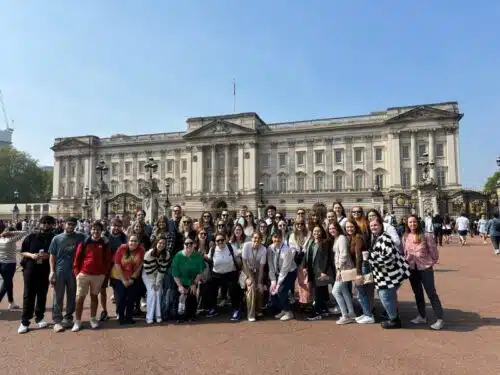Autism Travel Adventure: How to Break Barriers and Unleash the Wanderlust
Traveling is a fundamental human experience that can provide individuals with many advantages, from broadening perspectives to developing new social skills. However, for individuals with low support needs autism, an adult travel adventure can offer even more significant benefits that can lead to improved well-being and quality of life.

One of the most notable advantages of an autistic adult travel adventure is the opportunity to experience new things. For individuals with autism, routine and familiarity can be comforting and soothing, but at the same time limiting. Planning an adult travel adventure to new destinations can provide certain individuals with autism with an opportunity to break out of their comfort zone, challenge themselves to try new activities, and explore new cultures.
By exposing themselves to new experiences, individuals with autism can broaden their perspectives and expand their horizons.
Traveling can also offer a great platform for practicing social skills. Socializing can be a significant challenge for individuals with autism, and it can take a lot of effort and energy to connect with others. However, travel can provide an opportunity to meet new people and interact with individuals from different backgrounds.
In addition, adventure travel for singles can help individuals with autism learn how to navigate new social situations, build relationships, and develop new friendships.
By meeting new people who share similar interests, individuals with autism can enhance their social skills and improve their self-confidence.
Learn more about autism and overcoming social awkwardness and about over-socializing and autism.
In addition to social skills, sensory processing is another significant challenge that many individuals with autism face. Sensory processing refers to how the brain interprets sensory input from the environment, such as sound, smell, or light.
For some individuals with autism, sensory processing can be overwhelming, and it can affect how they interact with their surroundings.
A travel adventure can help individuals with autism find new ways to cope with sensory stimuli and identify new strategies for relaxation and self-calming.
For instance, individuals with autism can try different techniques like deep breathing, meditation, or sensory toys to help them regulate their senses during travel.
Learn more about autism and sensory sensitivities.
Another significant benefit of a travel adventure, including adventure travel for singles, is the opportunity to build independence and adaptability.
Traveling involves encountering new situations, and it can challenge individuals to learn how to cope with unexpected changes or obstacles. For individuals with autism, travel can provide a chance to build confidence and self-reliance, which can translate into improved performance in everyday life.
By learning how to navigate new environments, individuals with autism can develop new skills and strategies that they can apply to other areas of their lives.
It’s important to first consider how adaptable and comfortable an individual is with handling situations when things don’t go as planned. This holds true for anyone, and not just for those on the spectrum.
Finally, travel can be a source of pure joy and adventure. A travel adventure can be a life-affirming experience, providing an opportunity to explore new places, meet new people, especially if participating in adventure travel for singles, and enjoy new experiences.
For individuals with autism, who may sometimes feel constrained by routine, travel can offer a welcome break from the familiar and an opportunity to embrace the unknown. Traveling can provide individuals with autism with new perspectives, new memories, and new ways of seeing the world.
Learn more about autism and independence.
Travel Adventures When Traveling with an Individual on the Spectrum
If you’re considering a travel adventure with someone who has autism, there are several things to keep in mind to make the trip a positive experience.

You’ll want to research destinations, transportation options, and accommodations to make sure they are appropriate and safe.
Second, it’s crucial to maintain a consistent routine as much as possible while traveling. Keeping familiar routines, such as meal times or bedtime, can help individuals with autism feel more comfortable and secure.
Finally, it’s essential to be flexible and patient during travel. Unexpected changes can occur, and it’s important to remain calm and adaptable to ensure a positive experience for everyone involved.
There are numerous travel adventure groups, including adventure travel for singles, to look into. There are also special adventures tour groups for individuals aged 18 and over with special needs. Taking a travel adventure to new cities, states, and even across the world can be a transformative experience for individuals with autism.
By providing new experiences, social opportunities, and challenges, travel can help individuals with autism develop new skills, build confidence, and broaden their perspectives.
While there may be challenges and obstacles to overcome, the benefits of travel can be significant and long-lasting. If you’re considering traveling with an individual with autism, it’s important to approach the experience with care and preparation, but also with an open mind and a sense of adventure.
There are several travel destinations and activities that are particularly well-suited for individuals with autism. For example, many theme parks and resorts have implemented sensory-friendly options to accommodate guests with autism.
These accommodations might include designated quiet areas, noise-cancelling headphones, or sensory bags with items like fidget toys or weighted blankets. Similarly, some museums and attractions offer sensory-friendly events or specialized tours that provide a more relaxed and comfortable environment.
Outdoor activities, such as hiking or camping, can also be an excellent option for individuals with autism. Being in nature can be a calming and grounding experience, and the natural environment can provide a range of sensory stimuli that can be enjoyable and therapeutic.
Additionally, outdoor activities can provide opportunities for physical exercise and adventure, which can be beneficial for overall health and well-being.
Traveling internationally can also provide unique opportunities for many individuals with autism. Visiting different countries and experiencing different cultures can provide new perspectives on the world and help individuals with autism broaden their understanding of diversity and inclusivity.
However, international travel adventures may require additional planning and preparation, such as obtaining necessary visas, researching cultural customs and norms, and identifying local resources and support services. The flights can be long as well, so that is a consideration as to whether an individual is comfortable with very long flights.
Travel Adventure Fun is Different For Everyone

It’s important to approach travel with an individualized perspective and consider the specific needs and preferences of the individual with autism.
If you are autistic and feel confident and desire to see the world on your own terms, the good news is that there is most likely travel options that will meet your desires as well as your requirements.
While travel adventures may sound like the fulfillment of a dream, however, you will need to be practical in recognizing that every aspect of your life at home will be different when you travel.
Speak with your parents, friends, loved ones, family doctor, therapist, and anyone else who knows you well and seek out an honest assessment as to whether they think you will do well with a travel adventure.
Consider how you will respond if a flight is canceled or a highly anticipated tour gets canceled for some reason. It’s one thing to be disappointed, but quite another to melt down and act out. If you have extreme anxiety or a need for routine, consider starting with just a day or two trip to see how you handle it. Don’t just start off with a grand overseas trip, for example.
Not everyone enjoys travel, but for those who do love adventure, it can be a life-changing experience.
My Personal Travel Adventure Plans … Past, Present, and Future
I traveled to Iceland in September 2023 with my sister as part of my quest to see the world and explore new cultures and experiences. We actually planned to go in 2020, but obviously the pandemic put a hold on our plans. Three years later, and in spite of her living far from me, we made it happen!
Travel enthusiasts have said Iceland is one of the most beautiful places in the world with amazing natural landscapes, a frequently active volcano, and, of course, the Aurora Borealis… the best natural light show Mother Nature has to offer. We heard so much about the natural hot springs, which are like natural Jacuzzis created by the Earth, that we made that one of our priorities!
It was indeed a magical time, although we unfortunately did not get to see the Northern Lights while there. The ancient Vikings thought this was the place the gods lived, and that makes sense, as it’s truly a place fit for a pantheon of gods. Look up pictures of Iceland and you can see why so many people love this country. I’ll always have great memories of my time there.

I chose to travel with a young adult travel group, so I didn’t have to personally plan out the hotels and transportation, and chose to explore my past by taking a much longer trip to the U.K.
While a solo trip can be scary for anyone, and especially for someone with autism, it was what I chose to do to break out of my comfort zone. I saved up the money to go and departed in early May 2024.
It was exciting, stressful, exhilarating, and exhausting. I visited the countries of England, Wales, Scotland, and Ireland. The weather was incredible, but some of the accommodations were not.
Plans had to be changed at times, and I started missing the food I took for granted back in Texas. But I also tried all the local fares, even haggis. It allowed me to see beyond my usual perspective, and meet some interesting people who were very different than me.
More importantly, it let me know that while I may have some additional social struggles with life, I can find my place in the world and live my best life. So, having said that, I guess my trip was transformative for me. So much so, I’m about to take the longest flight of my life.
After almost a year off, and lots of work so I could save up, I am flying to Japan in April. Among the highlights: I will be there during the optimal cherry blossom season, I am going on some foodie tours, and I will be there at the right time that allows me to attend the 2025 World Expo in Osaka!
(I’ll have plenty to say about my latest adventure upon my return!)
In summary, traveling across the world can be a transformative and positive experience for individuals with autism if that is a goal and an ability. By providing new experiences, social opportunities, and challenges, travel adventures can help individuals with autism develop new skills, build confidence, and broaden their perspectives.
While there may be challenges and obstacles to overcome, the benefits of travel can be significant and long-lasting.
With careful planning, preparation, and an open mind, travel can provide individuals with autism with new opportunities for growth and adventure.
Autism in Adults: Living, Learning, and Overcoming Challenges for a Fulfilled Life
Autism in adults requires additional support and coping skills to achieve independence in today’s world. Learn more about ways adults can live fulfilled lives and the challenges they face.
- 14 Practical Ways for Staying Motivated to Unlock Full Potential
- Dangers of Social Media Addiction: How To Leave the Screens And Face the Real World
- Autism Volunteer Opportunities: 5 Ways Helping Others Fosters Acceptance
- 8 Heartfelt Ways Autism Emotional Support Animals Transform Lives
- Autism in the Future: Optimism for Improved Perception and Embracement
- Autism and AI: 7 Discoveries About the Surprise Pairing and Profound Impact
- Are You An Adult With Autism? Here Are 6 Signs
- Autism After High School: Is College the Next Step?
- Autism vs Asperger’s Syndrome: What You Need to Know
- Autism Disclosure: Is Revealing Your Disorder Helpful or Hurtful?
- Work and Autism: What Employers Should Know About Hiring People Like Me
- Drivers with Autism Can Achieve Success Behind the Wheel